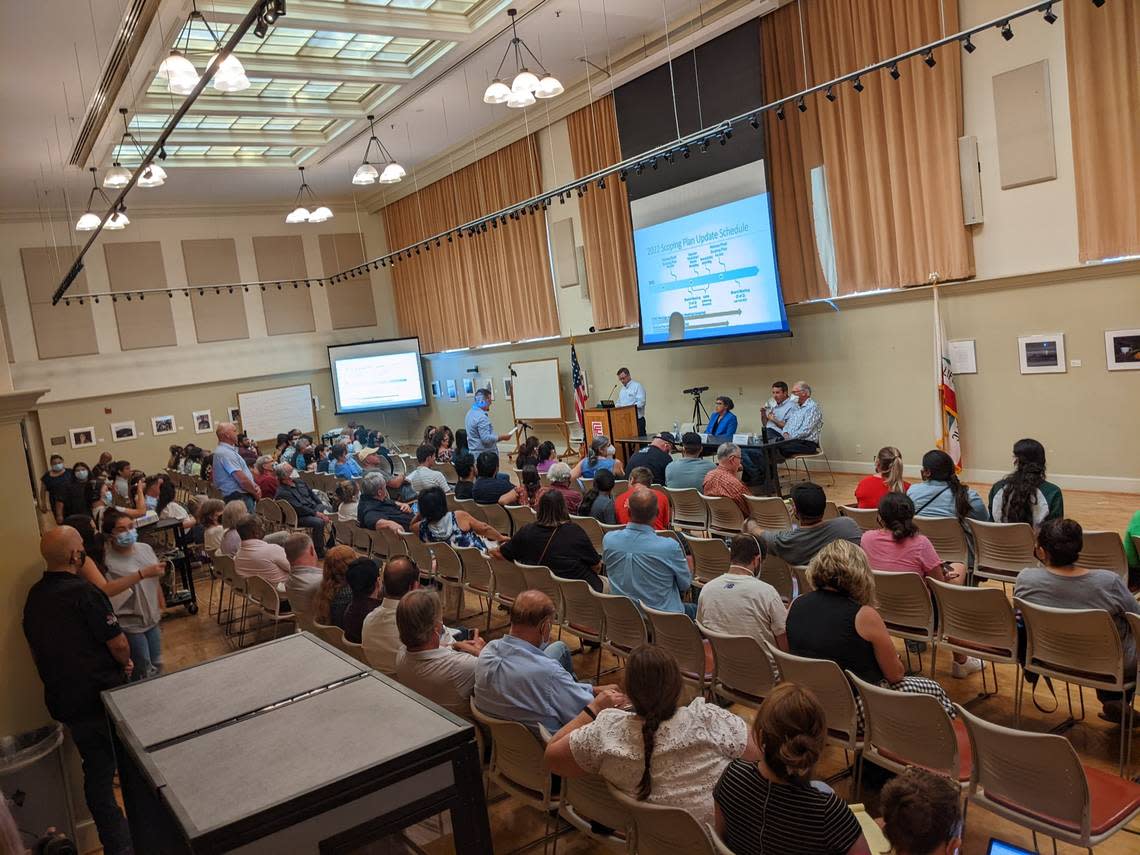‘We’re the guinea pigs.’ Valley groups speak out about California climate change plan
This story was produced by Fresnoland , a nonprofit news organization that partners with The Fresno Bee.
Dozens of central San Joaquin Valley residents expressed frustration about the California Air Resources Board’s massive carbon capture plans during a community listening session at Fresno City College on Wednesday night.
They condemned CARB’s proposed climate change plan which calls for up to 150 million tons of CO2 from ambient air and fossil fuel power plants to be annually captured and stored, presumably underneath the San Joaquin Valley.
The residents also told CARB chair Liane Randolph and board members Hector De La Torre and John Eisenhut that they were worried that the technology is a fossil fuel delay tactic, that CARB’s plan is inadequate and would force them to live with unacceptable levels of pollution for an additional 10 years.
Instead of making more substantial cuts to pollution by comprehensively replacing fossil fuels with wind, solar and energy storage, they said, CARB’s plan paves the way to extend the life of the state’s fossil fuel facilities for another decade by relying on carbon capture technology.
This has the effect of locking in pollution exposure from power plants and industrial processes while putting San Joaquin Valley rural communities at the front lines of a risky geoengineering experiment.
Mendota residents, who live near one of the first attempts to build a carbon capture project in the state, spoke out about how the project would have coupled noxious pollution from agricultural waste with geoengineering, all less than a mile away from Mendota High School.
“It feels like we’re the guinea pigs here,” said Ofelia Ochoa, a Mendota resident.
And Berta Alvarado said she was concerned that CARB’s reliance on carbon capture “is only going to contaminate and put us at risk.”
Only a community opposition campaign and series of last-minute meetings with Environmental Protection Agency regional officials stopped Chevron and Clean Energy Systems from building the Mendota carbon capture project last year.

Juan Flores, an organizer with the Center for Race, Poverty, and the Environment, said that CARB’s draft climate plan relies on environmental extraction from rural Valley communities.
“This is the one scoping plan that can change the face of California for generations to come, either for good or bad,” he said. “Stop making our communities experimentation, sacrificial zones.”
CARB’s scoping plan met with widespread criticisms
This May, California released a draft of its climate scoping plan, the state’s five-year plan to fight climate change.
The main goal of the plan is to get annual carbon dioxide emissions in California down to zero by 2045.
Roughly 70% of the emissions cut will come from electrifying the state’s transportation, industrial and building sectors, directing billions of dollars from state funds to electric car subsidies, transforming the state’s electricity grid and cleaning up industrial pollution.
However, the plan drew immediate criticism for the unprecedented role carbon capture plays in the state’s remaining 30% of cuts, as well as delaying the state’s carbon transition for a decade. Critics of the technology point out that nearly every carbon capture project in the world has failed to meet up to its CO2 reduction goals, and the technology does little to reduce toxic byproducts like PM2.5 pollution that are emitted from fossil fuel infrastructure.
CARB justified its preliminary decision to delay the state’s decarbonization by saying that California, the fifth-largest economy in the world, cannot afford to decarbonize by 2035.
Not satisfied with CARB’s calculus, newspaper editorial boards, think tanks and community groups have pointed out the plan’s huge math errors and called on CARB to revise the climate scoping plan.
In June, communities across the state piled into CARB’s meeting hall in Sacramento to show their opposition to the plan’s climate delays and reliance on carbon capture tech.
The crowd was so large that CARB called for an emergency series of listening sessions across the state to hear more from communities about the plan’s vision for California’s climate future.
Wednesday’s meeting in Fresno was the Valley’s portion of the emergency sessions. Approximately 100 community residents, agribusiness representatives and dairy farmers were in attendance to gave CARB their input about carbon capture, dairy digesters, electric vehicle subsidies and pesticide regulation.
Fresno leader says CARB’s climate plan doesn’t do enough to protect women, babies
The night’s loudest roar of applause came when Dr. Venise Curry, a leader with Concerned Citizens of West Fresno, told Randolph that the plan’s 10-year delay to slash emissions was unacceptable from the standpoint of women’s and infant health.
In south Fresno, she said, Blacks suffer an infant mortality rate that “rivals third-world countries.”
Previous reporting by Fresnoland found that a major cause of this public health disaster is institutionalized racism, which has created a network of highways and industrial development that exposes pregnant women in south Fresno to the state’s highest levels of PM2.5 pollution. This pollution is linked to a mother’s increased risk of preterm birth and fetal death.
Curry told Randolph that delaying the state’s decarbonization timeline for another decade would cause CARB to miss a major opportunity to slash PM2.5 pollution and save the lives of women and babies across the state.
“What we don’t want is a solution that’s going to impact our communities that are already overburdened,” Curry said.
“It isn’t enough to include [environmental justice] if there’s no implementation, if there’s no respect for, the real issues that absolutely shorten your lifespan.”
Gregory Weaver is a freelance journalist based in California’s central San Joaquin Valley. He can be reached at gweav37@gmail.com. This story was written in partnership with Fresnoland.
